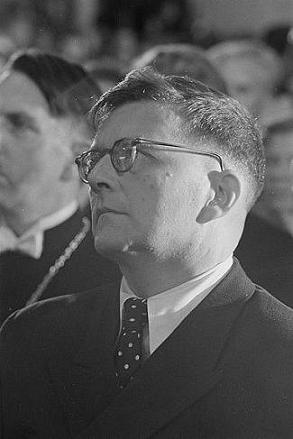Classical Music Pick: CSO And A Tale Of Two Russians
By Alexander Hough in Arts & Entertainment on Mar 3, 2010 7:40PM
The career of Dmitri Shostakovich (1906-1975), which got underway shortly after the Bolshevik Revolution in 1917, can be seen broadly as cycling between angering the Soviet authorities and getting back in their good graces. The paper trail of the actual intentions behind his various pieces of music is thin and often contains an array of dubious patriotic claims. That was, of course, out of necessity. Being on the wrong side of Stalin often led to the gulag, or worse.
His Symphony No. 11, being performed Thursday through Saturday by the Chicago Symphony Orchestra under Charles Dutoit's baton, is likewise enigmatic. The piece is subtitled "The Year 1905," which refers to the revolution that established a constitutional monarchy. Specifically, the piece concerns itself with the massacre that precipitated the upheaval; on January 9, soldiers opened fire on peaceful protesters gathered at the Winter Palace of Czar Nicholas II, killing hundreds of civilians. In addition to commemorating an event important to the Soviet revolutionary narrative, the symphony has as its main thematic elements 19th-century revolutionary songs and was written in 1957 for the 40th anniversary of the 1917 revolution.
But we're dealing with the evasive Shostakovich, so it's more complicated than that. Scholars point (albeit inconclusively based on a questionable source) to the previous year's uprising in Hungary, in which state police killed anti-Stalinist protesters. The parallels between this event and the January 9 "Bloody Sunday" are clear, but where democracy was successful in 1905, it was brutally crushed a half century later. That it was put down with the help of the Red Army only brought into clearer focus the tragic turn the 1905 revolution - a revolution which Shostakovich extolled - had taken. In this context, the Eleventh Symphony is an elegy rather than a celebration. Keep all this in mind while listening to the CSO's performance, but take it with a grain of salt. Shostakovich's music is emotional, not cerebral, and a performance of his work is about the only reliable document we have. Maybe more so that any other composer, with Shostakovich the truth is found by listening.
Opening this weekend's concerts will be the Second Piano Concerto (Kirill Gerstein, soloist) by Shostakovich's fellow countryman Sergei Rachmaninoff (1873-1943). Rachmaninoff's life was comparatively simple - during the events of 1905, he fled to Italy and Germany, and then left Russia forever after the 1917 revolution. The most drama surrounding the composition of his Second Piano Concerto was that he was feeling pessimistic about his talent after his First Symphony bombed in 1897, four years prior to the great C minor concerto's premiere. So take a lesson from Rachmaninoff: If you're ever feeling down, just compose one of the greatest pieces of music ever written.
Thursday at 8:00 p.m., Friday at 1:30 p.m., and Saturday at 8:00 p.m., Symphony Center, 220 S Michigan, $23-$199, $10 students
